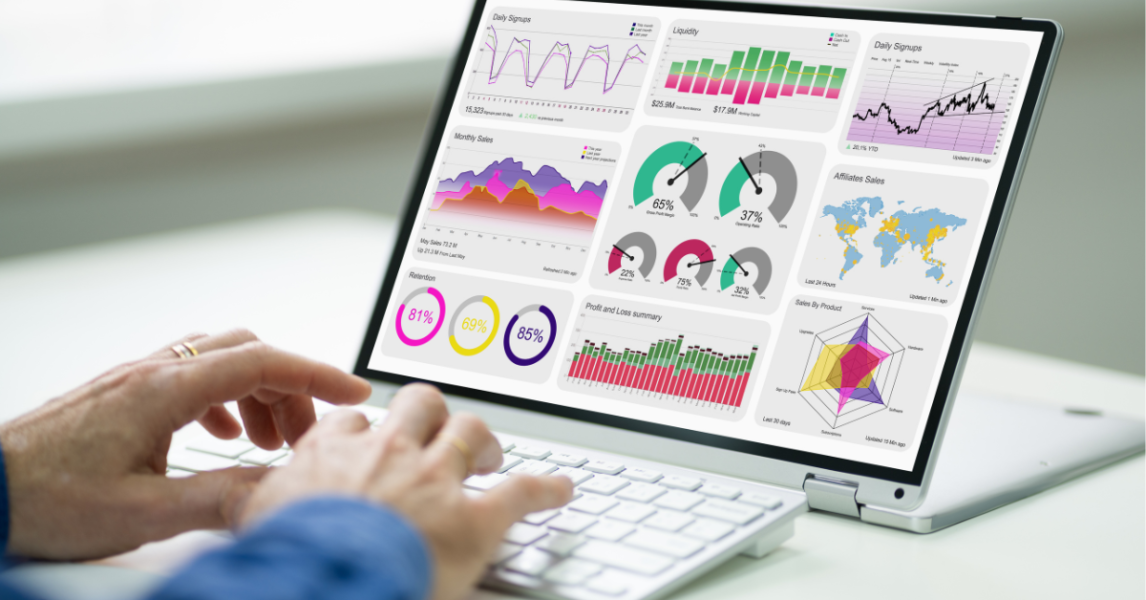Data analytics is a powerful tool that has revolutionised many sectors and industries and will continue to do so in the future. Simply owning a website is no longer sufficient, in order for your company to grow and thrive you need to track, assess, analyse and interpret your company’s data.
What is data analytics?
Data analytics is statistics obtained from tracking the activity on a website and interaction with its users. The data is used to track patterns and identify trends based on website usage. It improves the speed and efficiency of your business. You can obtain large amounts of data about the usage of a website, data analytics also includes sifting or sorting this data to deduce useful information. This information is crucial in understanding your business’s performance as well as its successes and weaknesses.
Ways to use data analytics
- Better customer service: data analytics allows you to tailor customer service according to their needs and allows you to build strong relationships with your customers. Data can provide information in relation to customers interests, needs and concerns allowing you to provide better recommendations for products and services.
- Effective marketing: data analytics gives you valuable insights in relation to the performance of your campaigns allowing you to adjust them accordingly for the best outcomes.
- Improved decision making: it eliminates manual tasks, businesses can use the information they gain from data analytics to make the right decisions for their business resulting in better outcomes and greater customer satisfaction.
Importance of understanding and utilising data analytics
Tracking and analysing digital analytics can be a game-changer for any business, here is how and why; Data analytics can provide key insights into the performance of any business venture, its profit, losses, better performing aspects and underperforming aspects. These insights can steer the future of any firm, shape its strategies, and help make key decisions that could lead the firm to a successful future.
Identifying problem areas
Tracking client’s behaviours on your website can help gauge the aspects that are not doing very well in the market. Based on this information, a company can reshape its strategies, target the weak areas or replace them entirely. Identifying problem areas is a crucial aspect of data analytics for any business. By tracking clients’ behaviours on your website, you can gain insights into the areas of your business that are underperforming or not meeting expectations. This information can be used to gauge what customers are looking for, what aspects of your business are not resonating with them, and what can be improved.
With the help of data analytics, you can identify specific patterns of behaviour, such as where customers are spending the most time on your website, which pages they are exiting from, or which products are not selling as well as others. This information can help you pinpoint the issues and take corrective measures to improve the performance of your business. Reshaping your strategies is a critical aspect of this process. By using data analytics to identify weak areas, you can target these specific areas for improvement or even replace them entirely. This could involve improving the user experience on your website, adjusting your marketing strategies, or even changing the products or services you offer.
Highlighting successes
Data analytics can help highlight the key areas of your business that are doing better than others. This data can also rope in potential investors by sharing the statistics that prove the company’s ventures are doing well. Data analytics can provide valuable insights into which areas of a business are performing well, and this information can be used to celebrate successes and identify areas for further investment and growth. By analysing key metrics such as website traffic, conversion rates, and customer engagement, businesses can gain a clear understanding of which products, services, or marketing strategies are resonating with their target audience.
Highlighting these successes can be a powerful tool in attracting potential investors, as they will be more likely to invest in a business that has a proven track record of success. By sharing statistics and data that demonstrate the company’s strong performance in certain areas, businesses can build trust and credibility with investors and stakeholders.
Spotting trends
Market trends keep evolving and changing as a result of varying unpredictable factors. With the help of data analytics, companies can spot these market trends and utilise the information to gain the maximum benefits. With the help of data analytics, you can also predict future trends.
Spotting trends is one of the most crucial benefits of data analytics for businesses. It enables companies to stay ahead of their competitors and predict the future needs of their customers. By analysing data from various sources such as customer feedback, sales data, and social media activity, companies can identify patterns and trends in consumer behaviour. For example, a company that sells outdoor gear may notice a surge in sales for a particular product during the summer months, indicating a seasonal trend that they can capitalise on. Spotting trends can also help companies to adapt their products or services to meet changing consumer demands. For instance, if a company notices a shift in customer preferences towards sustainable products, they can adjust their production and marketing strategies to cater to this demand.
Analytics for social media marketing
Using data analytics for social media marketing by tracking the analytics of users, their age group and profession can help a firm understand their audience. This understanding can help shape the tone of a company’s pitch, image and strategy to grow its client pool. Social media platforms have become a popular place for businesses to promote their products or services, and data analytics can help make the most of these efforts. By analysing social media metrics such as likes, shares, comments, and engagement rates, businesses can gain insights into their audience’s behaviour and preferences.
Data analytics for marketers
Customers past shopping and spending patterns become less predictive for future behaviour when times are unstable. Marketers need to be able to learn as they go, responding to what they see in the present moment. To do this marketers will need to use data analytics to get the information they need.
Data analytics can be a game-changer for marketers who are looking to stay on top of their game. With the help of data analytics, marketers can gain valuable insights into the behaviour and preferences of their target audience. By tracking customer data such as past purchases, browsing history, and other relevant metrics, marketers can understand the customers’ likes, dislikes, and buying habits. This understanding can then help them create targeted marketing campaigns that are more likely to resonate with their audience. Data analytics can also help marketers identify trends and patterns in customer behaviour that can be used to predict future buying trends. This information can be used to develop marketing strategies that are proactive rather than reactive, giving businesses a competitive advantage in the market.
Finding answers for relevant questions
Once you have access to the data analytics that has been tracked, you can find answers to important questions such as your most common products or posts? What is the best time to post new updates or send newsletters? What browser or devices are most used by visitors? Different firms would have a different set of questions relevant to them. You need to come up with a set of relevant questions for your company that you can answer with the help of data analytics.As businesses strive to improve their online presence and customer experience, having access to data analytics becomes critical. It allows marketers and business owners to track their digital performance, analyse customer behaviour, and gain valuable insights that can help drive business growth. By asking relevant questions, companies can use data analytics to find answers and make informed decisions.For example, knowing the best time to post new updates or send newsletters can help businesses optimise their marketing campaigns and reach their target audience at the right time.
Setting future goals
The insights and analysis provided by data tracking can put things in perspective for any firm. They can help set future goals by keeping in cognisance the past performance of the firm, its strengths and weaknesses. Data analytics can give a full foundation for the future goals of any firm.
Setting future goals is a crucial part of any business strategy, and data analytics can play a significant role in this process. By analysing past data, businesses can identify patterns and trends, understand what has worked well in the past, and what areas need improvement. This information can then be used to set realistic and achievable goals for the future.Data analytics can help businesses identify which services are most in demand, which marketing channels are most effective, and which customer segments are the most profitable. Armed with this information, businesses can then set specific targets for growth, such as increasing sales revenue by a certain percentage, expanding into new markets, or launching new products.
Data analytics is the future
It helps in understanding a company’s performance, engagement and taking remedial actions accordingly. Data analytics is the future of everything, it is everywhere in all aspects of our lives. It has fundamentally changed the way we do business. If you haven’t already, start tracking data and interpreting data analytics for maximum future benefits.




